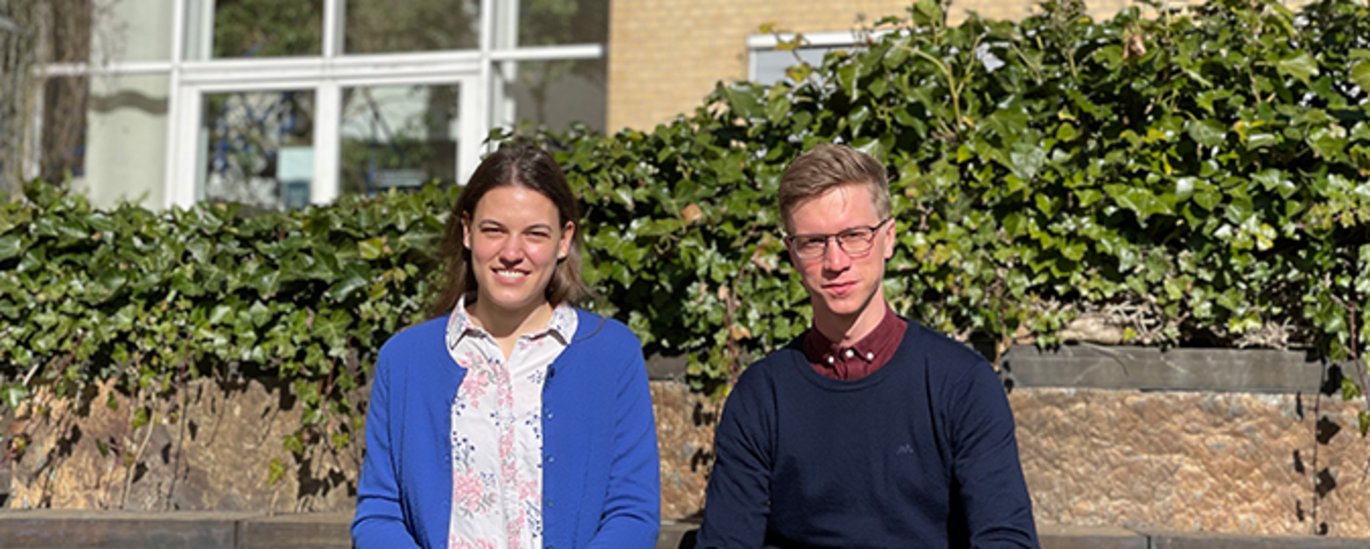Two postdocs get a unique chance to join Sorbonne Université and Harvard Medical School
With competitive grants from the Independent Research Fund Denmark and the Lundbeck Foundation, two postdocs from the Department of Molecular Biology and Genetics at Aarhus University, Alessandra Zarantonello and Henrik Pedersen, have now been given the unique chance to join the prestigious research institutions Sorbonne Université in Paris and Harvard Medical School in Boston, respectively.

Alessandra Zarantonello and Henrik Pedersen are currently both employed as postdocs in Professor Gregers Rom Andersen’s laboratory. Here, they study the molecular mechanisms governing the complement system, which is a part of the innate immune system and protects our body against infections. Also, excess activation of the complement system is considered to play a role in the development of a number of neurological diseases such as Alzheimer’s disease and schizophrenia.
Starting from June and August, respectively, Alessandra and Henrik will become postdocs at the renowned institutions Sorbonne Université and Harvard Medical School where they will continue to build on their prior work on the complement system and develop new methods to further elucidate the role of complement in pathogenesis.
In Paris, Alessandra will study the interplay between the complement system and cancer progression.
- "I am excited to learn more about the intricate relationship between cancer progression and the complement system with Dr. Roumenina, who is a pioneer in this field, which has really accelerated in recent years. Depending on the cancer type, complement activation can have a pro-tumoral or anti-tumoral effect, and much is still unknown about the mechanisms leading to each outcome. Moreover, uncharacterized, non-canonical functions of complement may be involved in cancer progression. It is an expanding field, and I believe this training will open many opportunities for my future career,” Alessandra says.
Henrik will study the relation between a complement protein called C4A and the development of schizophrenia.
- “It is appreciated that the complement system plays a role during neurodevelopment, but also that the complement system may be involved in a number of neurological diseases. I hope that we can get a better understanding of how the complement system affects this devastating disease,” Henrik says.
Will study the complement system in vivo within mouse models
Alessandra and Henrik will hence continue working on the complement system, but will move away from biophysical characterization and structural biology to study the complement system in vivo within mouse models.
- “I think it will be challenging for both of us to switch gears to focus more on the disease, but I am convinced that our training from Aarhus and our research exchanges during our PhD studies have provided us with sufficient skills to take on these tasks,” Henrik says.
- “I am honored to be a recipient of the international postdoc fellowship from the Danish Independent Research Fund. Having completed my PhD degree in Aarhus University, I am grateful to have the possibility of investing the competences acquired in Denmark in an international context. My undergraduate and graduate studies were carried out in different countries, namely Italy, Germany, Denmark, and the USA. Performing advanced research in France, and especially in Paris, will be another scientifically and culturally enriching experience that I look forward to starting,” Alessandra says.
Professor Gregers Rom Andersen is very proud of the two competitive grants the two postdocs have obtained
- “What I find most impressive is that both Alessandra and Henrik totally switch gear from atoms and equations to learn in vivo work. It demonstrates that structural biology can lead to so much else than becoming a nerdy scientist sitting at the computer. Instead, structural biology is a fantastic starting point for a very broad spectrum of careers in life science”.
Alessandra Zarantonello was awarded a 2-year postdoc grant from the Independent Research Fund Denmark (DFF) valued at DKK 1.414 M. With the grant Alessandra will join Dr. Lubka Roumenina’s laboratory at Centre de Recherche des Cordeliers, Sorbonne Université in Paris.
Henrik Pedersen was awarded a 3-year postdoc grant worth DKK 2.5 M from the Lundbeck Foundation. With the grant, Henrik will join Professor Michael Carroll’s laboratory at Harvard Medical School in Boston.
For further information, please contact
Postdoc Henrik Pedersen - henrik@mbg.au.dk
Postdoc Alessandra Zarantonello - azara@mbg.au.dk
Department of Molecular Biology and Genetics
Aarhus University, Denmark
